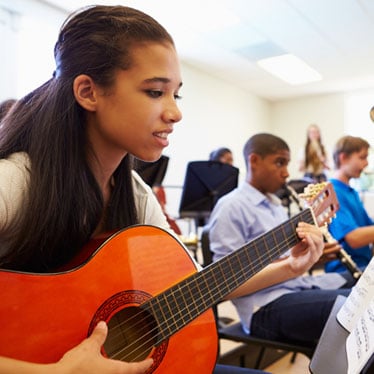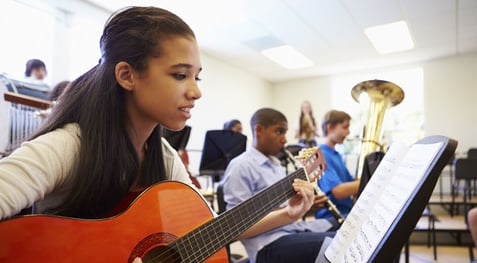What Do Music Students Need To Start The School Year Right


Getting back into your school routine after a long summer break is important for success, but it’s not always easy. You need to go through a little adjustment to transfer your thoughts and energy back towards your education rather than on just having fun. And for music students, this is doubly hard if you’ve been slacking off on your practice. Starting the new school year means being ready.
These tips and ideas can help students rearrange their priorities and help them pick up exactly where they left off. Some of the suggestions depend strictly on your mindset, while others require a little bit of assistance. Students and parents can make the transition easier by following a few simple steps.
Expectations of Success—Attitude Musts
Viewing the upcoming school year with thoughts of dreadful foreboding will only lead to depressed spirits and make it harder for you to concentrate on learning new concepts. However, if you’ll approach the new school year with enthusiasm, expecting success, it will make a huge difference in your performance. Be positive and confident about taking this next step in your music. You won’t regret it, and it’ll encourage and support your natural aptitude and playing skills.
Two Weeks before Classes Start:
There are some basic steps that you can take to make the new school year start off on the right foot. Getting ready for a new routine means changing your habits to anticipate your upcoming needs. These ideas can help:
Go to bed earlier. A good night’s sleep is essential for learning. Start going to bed a little earlier each night until you hit the right time. According to the Nationwide’s Children’s Hospital, adolescents ages 13-18 need at least nine to nine-and-a-half hours of sleep each night. They cite early school hours, extracurricular activities, and a biological shift in sleeping patterns as the primary reasons for this amount of time.
The amount of time needed for school-age children (6-12 years) is even greater. They need at least 10-11 hours per night. Without enough sleep, academic performance, mood, behavior, and cognitive abilities are negatively influenced, so plan ahead to ensure that you’ll get the right amount of sleep before the new school year starts. Experts suggest that you develop a firm nighttime routine and create an environment that supports good rest. No radio or TV noises, comfortable temperatures, and even a few minutes of reading before bedtime can help.
Eat a good breakfast. This point is often overlooked, but having the fuel you need to concentrate and perform is crucial for a successful new school year. Music training takes effort, and you can’t give it your all if you’re languishing from lack of nutrition.
Reinitiate your practice routine. During the summer, many students neglect their instrument in lieu of other outdoor activities. Since it’s important not get into a rut and become hostile toward your instrument, taking a break is a good idea. However, when it’s time to resume your training, there’ll be a little re-learning involved. Start small (a few minutes of practice each day), and then gradually build up to your normal practicing time. And, never, ever neglect to perform your warm-up exercises, especially since you haven’t used those muscles in a while.
Another good way to get ready for the new school year is to invite some other players over for a few jam sessions. You can play the music you learned last year, and maybe introduce some new pieces. There are tons of online sources that provide free (or very low-cost) sheet music for today’s most popular songs or legendary classics that still set the standard for Rock, Jazz, or other genres.
Take your instrument in for a “check-up.” Another problem with ignoring your string instrument for a long period of time involves its playing condition. Most likely, the strings are badly out of tune, but there may be additional problems. String instruments that lie dormant can develop hairline cracks along the seams from changes in temperature and humidity. If you’ve kept your instrument in its case with a humidifier, you’re probably alright. A luthier can tune and check your instrument for damage and make repairs, but you should be able to recognize any major problems yourself. Also, if you’re uncomfortable tuning your instrument with the pegs (fine tuners probably won’t cut it if your violin’s been abandoned for eight weeks), a violin shop or dealer will be able to set it straight, adjust the soundpost, and make any necessary minor fixes.
Shopping list. Don’t forget to pick up a few items like rosin, an extra set of strings, and similar basics.
Getting ready for the new school year doesn’t have to be filled with wretched misery. With the right attitude and steps, your upcoming year will be happy and successful.


